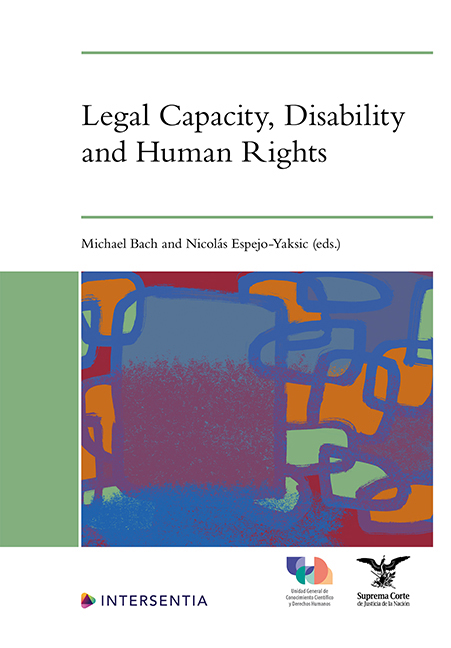Book contents
- Frontmatter
- Foreword
- Acknowledgements
- Contents
- List of Cases
- List of Contributors
- Legal Capacity, Disability and Human Rights: Introduction
- PART I HISTORICAL PERSPECTIVES AND THEORETICAL FRAMES
- PART II LAW REFORM: COUNTRY AND REGIONAL PERSPECTIVES
- PART III LEGAL QUESTIONS, PERSISTENT CHALLENGES
- Index
- About the Editors
Legal Capacity Regime Reforms in Costa Rica, Peru and Colombia: A Comparative and Critical Analysis
Published online by Cambridge University Press: 03 April 2024
- Frontmatter
- Foreword
- Acknowledgements
- Contents
- List of Cases
- List of Contributors
- Legal Capacity, Disability and Human Rights: Introduction
- PART I HISTORICAL PERSPECTIVES AND THEORETICAL FRAMES
- PART II LAW REFORM: COUNTRY AND REGIONAL PERSPECTIVES
- PART III LEGAL QUESTIONS, PERSISTENT CHALLENGES
- Index
- About the Editors
Summary
INTRODUCTION
Since the adoption of the United Nations Convention on the Rights of Persons with Disabilities (hereinafter CRPD) the right of persons with disabilities to legal capacity has experienced an unprecedented boost in Latin America. In 2015, Argentina carried out an important reform to its Civil and Commercial Code; very significant reforms have also been carried out in Brazil, and in the last five years, three countries in the region – Costa Rica, Peru and Colombia – have completed ground-breaking legislative reforms that have pointed a path forward for other countries with in and outside the region. These reforms are considered an international benchmark due to their comprehensive nature and for the active participation of persons with disabilities in their design and drafting.
In this context, this chapter seeks to analyse comparatively and critically the legislative reforms in legal capacity carried out by Costa Rica, Peru and Colombia. To this end, the processes and contents of the reforms achieved in each country will be described. Then their elements will be analysed comparatively in light of the standards developed by the Committee on the Rights of Persons with Disabilities (hereinafter CRPD Committee). Finally, the challenges and limitations in implementing these reforms will be described and analysed. Thus, this chapter will provide valuable lessons for the new reform processes that are underway.
ARTICLE 12 OF THE CRPD AND ITS IMPACT IN LATIN AMERICA
COSTA RICA
Situation before Reform
The Costa Rican Civil Code established in 1996 that “legal capacity is inherent to persons throughout their existence” and, for natural persons, “it is modified or limited, according to the Law, by their marital status, their volitional or cognitive capacity or their legal capacity” . Likewise, the Civil Code makes express reference to the possibility of judicially declaring a person's incapacity and annulling “acts or contracts that are carried out with out volitional or cognitive capacity”. Although the capacity to act is presumed, it is an iuris tantum presumption. The Civil Code also establishes specific restrictions for those “who are not of sound judgment” to make a will. These provisions were maintained after reform was achieved.
- Type
- Chapter
- Information
- Legal Capacity, Disability and Human Rights , pp. 131 - 152Publisher: IntersentiaPrint publication year: 2023



